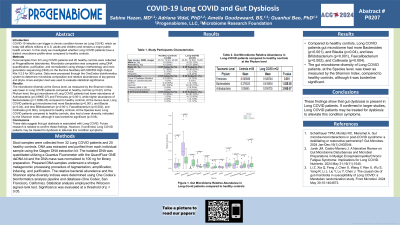Sunday Poster Session
Category: Colon
P0207 - COVID-19 Long COVID and Gut Dysbiosis
Sunday, October 27, 2024
3:30 PM - 7:00 PM ET
Location: Exhibit Hall E

Has Audio
- AV
Adriana Vidal, PhD
ProgenaBiome
Ventura, CA
Presenting Author(s)
Adriana Vidal, PhD, Brad Barrows, MD, Guanhui Bao, PhD, Amelia Goudzwaard, BS, Andreas Papoutsis, PhD, Sabine Hazan, MD
ProgenaBiome, Ventura, CA
Introduction: COVID-19 infection can trigger a chronic condition known as Long COVID, which as today still affects millions of U.S. adults and children and remains a major public health concern. In this study we investigated whether Long COVID patients have a distinct microbiome profile when compared to healthy controls.
Methods: Fecal samples from 32 long COVID patients and 20 healthy controls were collected at ProgenaBiome laboratories. Microbiota composition was compared using DNA quantification, purification, and normalization using shotgun methodology and next-generation sequencing (NGS) on the Illumina NextSeq with 500/550 High-Output Kits V.2.5 for 300 cycles. Data were processed through the OneCodex bioinformatics system to determine microbiota composition and relative abundances of top genera and phyla. A two-sample t-test was used to evaluate statistical significance.
Results: The microbiome diversity at the Genus level, as measured by the Shannon Index, was lower in Long COVID patients compared to healthy controls (p=0.02). At the Phylum level, the gut microbiome of Long COVID patients had lower abundance of Actinobacteria (p=3.990E-07) and Firmicutes (p=0.001), while higher abundance of Bacteriodetes (p=1.026E-05) compared to healthy controls. At the Genus level, Long COVID patients gut microbiome had more Bacteroides (p< 0.001), and Blautia (p=0.04), and less Bifidobacterium (p< 0.001), Faecalibacterium (p=0.002), and Collinsela (p=0.004), compared to healthy controls. At the Species level, Long COVID patients compared to healthy controls, also had a lower diversity, indicated by the Shannon Index, although it was borderline significant (p=0.06).
Discussion: These data suggest that gut dysbiosis is associated with Long COVID. Future research is needed to confirm these findings. However, if confirmed, Long COVID patients may be treated for dysbiosis to alleviate this condition symptoms.
Disclosures:
Adriana Vidal, PhD, Brad Barrows, MD, Guanhui Bao, PhD, Amelia Goudzwaard, BS, Andreas Papoutsis, PhD, Sabine Hazan, MD. P0207 - COVID-19 Long COVID and Gut Dysbiosis, ACG 2024 Annual Scientific Meeting Abstracts. Philadelphia, PA: American College of Gastroenterology.
ProgenaBiome, Ventura, CA
Introduction: COVID-19 infection can trigger a chronic condition known as Long COVID, which as today still affects millions of U.S. adults and children and remains a major public health concern. In this study we investigated whether Long COVID patients have a distinct microbiome profile when compared to healthy controls.
Methods: Fecal samples from 32 long COVID patients and 20 healthy controls were collected at ProgenaBiome laboratories. Microbiota composition was compared using DNA quantification, purification, and normalization using shotgun methodology and next-generation sequencing (NGS) on the Illumina NextSeq with 500/550 High-Output Kits V.2.5 for 300 cycles. Data were processed through the OneCodex bioinformatics system to determine microbiota composition and relative abundances of top genera and phyla. A two-sample t-test was used to evaluate statistical significance.
Results: The microbiome diversity at the Genus level, as measured by the Shannon Index, was lower in Long COVID patients compared to healthy controls (p=0.02). At the Phylum level, the gut microbiome of Long COVID patients had lower abundance of Actinobacteria (p=3.990E-07) and Firmicutes (p=0.001), while higher abundance of Bacteriodetes (p=1.026E-05) compared to healthy controls. At the Genus level, Long COVID patients gut microbiome had more Bacteroides (p< 0.001), and Blautia (p=0.04), and less Bifidobacterium (p< 0.001), Faecalibacterium (p=0.002), and Collinsela (p=0.004), compared to healthy controls. At the Species level, Long COVID patients compared to healthy controls, also had a lower diversity, indicated by the Shannon Index, although it was borderline significant (p=0.06).
Discussion: These data suggest that gut dysbiosis is associated with Long COVID. Future research is needed to confirm these findings. However, if confirmed, Long COVID patients may be treated for dysbiosis to alleviate this condition symptoms.
Disclosures:
Adriana Vidal: Progenabiome – Employee. Progenabiome – Employee.
Brad Barrows: Progenabiome – Medical Director at Progenabiome. Progenabiome – Medical Director at Progenabiome.
Guanhui Bao: Progenabiome – Consultant. Progenabiome – Consultant.
Amelia Goudzwaard: Progenabiome – Employee.
Andreas Papoutsis: Progenabiome – Consultant.
Sabine Hazan: Microbiome Resarch Foundation – Owner/Ownership Interest. Microbiome Research Foundation – Owner/Ownership Interest.
Adriana Vidal, PhD, Brad Barrows, MD, Guanhui Bao, PhD, Amelia Goudzwaard, BS, Andreas Papoutsis, PhD, Sabine Hazan, MD. P0207 - COVID-19 Long COVID and Gut Dysbiosis, ACG 2024 Annual Scientific Meeting Abstracts. Philadelphia, PA: American College of Gastroenterology.
